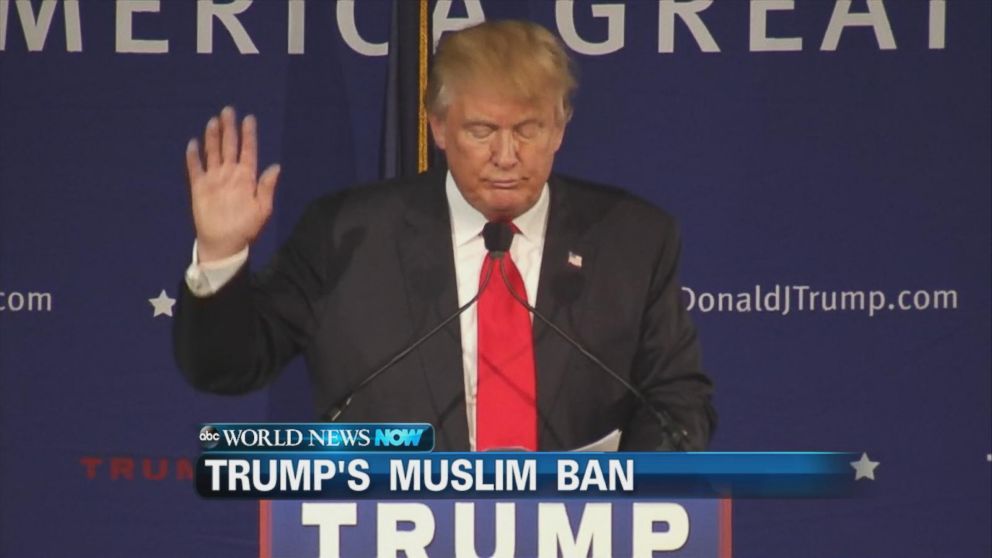
President Donald Trump, who was since his campaign shown his thought on the Muslim. The world is suffering from terrorism and people are trying to save the humanity and say that there is no religion of terrorism. But President Trump thinks differently and according to him United States will be safe if they ban the Muslim countries who are involving in spreading terrorism.
He is on his stand and for any President is good but such kind of decisions always be considered as a dictatorship. President Trump’s order banned immigration for 90 days from Iran, Iraq, Libya, Somalia, Sudan, Syria and Yemen. It also halted the admission of Syrian refugees indefinitely along with all other refugees for 120 days, sparking confusion and outrage resulting in mass protests across the states. After the decision, tens of thousands of visas have been revoked from travellers heading to the US under Donald Trump’s travel ban, according to a US Department of Justice lawyer. The State Department confirmed “fewer than 60,000 individuals’ visas were provisionally revoked”.
When was the Order Signed?
The executive order, signed by President Trump last Friday, indefinitely suspended Syrian refugees, and barred nearly all travellers from seven Muslim-majority countries – Iran, Syria, Yemen, Iraq, Somalia, Libya and Sudan – for 90 days and blocked refugees for 120 days.
Soon after the order, this week the federal court of Seattle has temporarily blocked President Donald Trump’s executive order banning entry into the United States from seven Muslim-majority countries.
US District Judge James Robert, who was appointed by President George Bush in 2003, issued a temporary restraining order against the Trump administration’s restrictions, ruling that the ban would be immediately stopped nationwide.
Within hours of the ruling, government officials told airlines in a conference call to begin allowing previously barred passengers to fly. However, the White House issued a statement late Friday announcing that the Department of Justice would file an emergency halt of judge’s order. Before sending a second, revised statement to the media, the White House called the judge’s ruling “outrageous.”
In Attorney Ferguson’s 90-page lawsuit, he claims the Trump administration is violating the Constitution’s protections for religious freedom. The state of Minnesota has also joined the state of Washington’s lawsuit which is backed by major companies including Amazon, Expedia, and several institutions of higher-education.
New York and Virginia have also taken legal action against the president.
But all this exercise will really stop the terrorism?
Trump picked the wrong countries
Set aside the question of whether imposing blanket bans on entire countries’ populations because of the actions of a few evil individuals is justified either morally or on human rights grounds. The bigger problem is that it also isn’t likely to do much to reduce the terrorism threat.
Faisal Shahzad, the attempted Times Square bomber, was Pakistani-American. Umar Farouk Abdulmutallab, the infamous “underwear bomber,” was Nigerian. Richard Reid, whose 2001 attempt to blow up an airplane with explosives hidden in his shoes is the reason we still have to stand barefoot in the TSA line more than 15 years later, was born in the UK to a white English mother and a mixed-race Jamaican immigrant father. Nidal Hasan, who killed 13 people at Fort Hood in 2009, was born in Virginia to Palestinian parents.
And the 9/11 hijackers? Fifteen were from Saudi Arabia, two were from the United Arab Emirates, one was from Lebanon, and one was Egyptian. Osama bin Laden was a Saudi citizen, and his top deputies — including the current leader of al-Qaeda, Ayman al-Zawahiri, were Egyptian.
Literally not a single one of those countries is on Trump’s list, and the ones that do show up repeatedly — especially Pakistan, Saudi Arabia, and Egypt — aren’t on the list.
Including Iran makes even less sense. The Iranians are most definitely one of the largest state sponsors of terrorism, but they prefer to arm and train Arabs in places like Lebanon, Palestine, Iraq, and Yemen to do their work for them. The only terrorist attack an Iranian has tried to carry out in the US was a bizarre foiled plot to assassinate the Saudi ambassador as he dined at an upscale restaurant in Washington, DC, in 2011.
There was one terror attack in Minnesota in 2016 carried out by a 20-year-old Somali immigrant, in which 10 people were injured (but no one died). And a few Somali Americans have in recent years been arrested and prosecuted for attempting to travel to Syria to join ISIS, but even then, they wanted to leave the US to commit terror attacks, not carry them out here.
And as my colleague Zack Beauchamp has written, the average likelihood of an American being killed in a terrorist attack in which an immigrant participated in any given year is one in 3.6 million — even including the 9/11 deaths. The average American is more likely to die from their own clothing or a toddler with a gun than an immigrant terrorist. But we’re not banning guns and T-shirts from coming into the country.
Banning people from a few Muslim-majority nations won’t reduce the terror threat. And it definitely won’t eliminate it.
